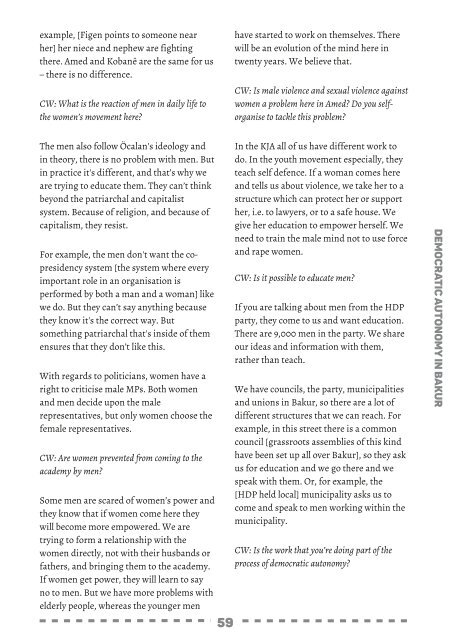STRUGGLES
Struggles-for-autonomy-in-Kurdistan
Struggles-for-autonomy-in-Kurdistan
Create successful ePaper yourself
Turn your PDF publications into a flip-book with our unique Google optimized e-Paper software.
example, [Figen points to someone near<br />
her] her niece and nephew are fighting<br />
there. Amed and Kobanê are the same for us<br />
– there is no difference.<br />
CW: What is the reaction ofmen in daily life to<br />
the women’s movement here?<br />
have started to work on themselves. There<br />
will be an evolution ofthe mind here in<br />
twenty years. We believe that.<br />
CW: Is male violence and sexual violence against<br />
women a problem here in Amed? Do you selforganise<br />
to tackle this problem?<br />
The men also follow Öcalan's ideology and<br />
in theory, there is no problem with men. But<br />
in practice it's different, and that’s why we<br />
are trying to educate them. They can’t think<br />
beyond the patriarchal and capitalist<br />
system. Because ofreligion, and because of<br />
capitalism, they resist.<br />
For example, the men don't want the copresidency<br />
system [the system where every<br />
important role in an organisation is<br />
performed by both a man and a woman] like<br />
we do. But they can’t say anything because<br />
they know it's the correct way. But<br />
something patriarchal that's inside ofthem<br />
ensures that they don’t like this.<br />
With regards to politicians, women have a<br />
right to criticise male MPs. Both women<br />
and men decide upon the male<br />
representatives, but only women choose the<br />
female representatives.<br />
CW: Are women prevented from coming to the<br />
academy by men?<br />
Some men are scared ofwomen’s power and<br />
they know that ifwomen come here they<br />
will become more empowered. We are<br />
trying to form a relationship with the<br />
women directly, not with their husbands or<br />
fathers, and bringing them to the academy.<br />
Ifwomen get power, they will learn to say<br />
no to men. But we have more problems with<br />
elderly people, whereas the younger men<br />
59<br />
In the KJA all ofus have different work to<br />
do. In the youth movement especially, they<br />
teach selfdefence. Ifa woman comes here<br />
and tells us about violence, we take her to a<br />
structure which can protect her or support<br />
her, i.e. to lawyers, or to a safe house. We<br />
give her education to empower herself. We<br />
need to train the male mind not to use force<br />
and rape women.<br />
CW: Is it possible to educate men?<br />
Ifyou are talking about men from the HDP<br />
party, they come to us and want education.<br />
There are 9,000 men in the party. We share<br />
our ideas and information with them,<br />
rather than teach.<br />
We have councils, the party, municipalities<br />
and unions in Bakur, so there are a lot of<br />
different structures that we can reach. For<br />
example, in this street there is a common<br />
council [grassroots assemblies ofthis kind<br />
have been set up all over Bakur], so they ask<br />
us for education and we go there and we<br />
speak with them. Or, for example, the<br />
[HDP held local] municipality asks us to<br />
come and speak to men working within the<br />
municipality.<br />
CW: Is the work that you’re doing part ofthe<br />
process ofdemocratic autonomy?<br />
democratic autonomyin bakur


